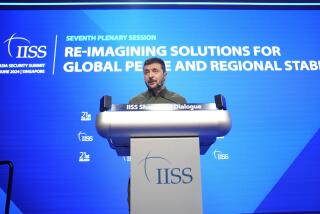Two Key Leaders Threaten to Boycott Cambodia Talks
- Share via
JAKARTA, Indonesia — Threats by Cambodian rivals Prince Norodom Sihanouk and Hun Sen to come to Jakarta but not meet dampened superpower hopes Friday that talks here might help end the war in the Southeast Asian country.
Hun Sen’s Phnom Penh government and Sihanouk’s guerrilla coalition have faced a week of pressure by their backers--the United States, the Soviet Union and China--to agree to meet and endorse a plan giving the United Nations a key role in achieving a settlement.
“Although I am going to Jakarta, I have decided not to attend the meeting as long as Sihanouk still boycotts this forum,” Cambodia’s official Kampuchea Information Agency quoted Hun Sen, the Communist country’s prime minister, as saying before he left for Jakarta Friday. He arrived Friday evening.
Sihanouk on Thursday reversed an earlier decision not to attend the meeting but has said he will not directly participate in the talks intended to bring his coalition of the Chinese-backed Khmer Rouge and two weak non-communist armies to the negotiating table with the Phnom Penh government.
Diplomats in Bangkok, Thailand, who watch the Cambodian situation said Sihanouk might be refusing to take part in the talks because he did not want to be called out over a June 5 agreement he reached, and later repudiated, after direct negotiations with Hun Sen in Tokyo.
That pact, rejected by the Khmer Rouge, by far the most powerful element of Sihanouk’s alliance, called for seats on a transitional council to be equally divided between the Phnom Penh government and the guerrilla alliance. The Khmer Rouge wants a role for itself equal to that of the Phnom Penh government.
Indonesian Foreign Minister Ali Alatas, who as host of the talks has battled to bring the factions together and get them to meet, was sanguine about the chances of a meeting.
“Let’s wait and see,” he said.
Alatas said Sihanouk’s planned arrival in the Indonesian capital late today meant the talks, already delayed by squabbling by the factions over protocol, could not start until Sunday.
The factions are under increasing pressure to compromise.
The superpowers, tired of funding the war and preoccupied with the Persian Gulf crisis and changes in Eastern Europe, have joined with their permanent U.N. Security Council colleagues Britain and France to support of the U.N. plan and expect the faction leaders to follow suit, diplomats said.
Soviet Foreign Minister Eduard A. Shevardnadze said Friday that he would open talks with Sihanouk. The announcement mirrored a decision Wednesday by the United States, a supporter of Sihanouk, to begin a dialogue with Soviet protege Hun Sen.
Diplomats said the talks were likely to center on endorsing the U.N. role--something all sides have done separately in principle--and setting up a Supreme National Council that would yield most of its authority to the United Nations.
More to Read
Sign up for Essential California
The most important California stories and recommendations in your inbox every morning.
You may occasionally receive promotional content from the Los Angeles Times.












